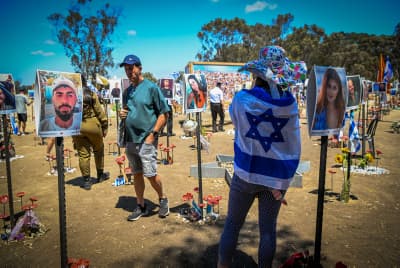Nova Festival Massacre
Here's how the Nova Festival massacre was very nearly prevented
Former Negev region commander Eyal Azulai reveals chilling details of the October 7 attack that shocked Israel. His testimony paints a picture of unheeded warnings, heroic resistance, and the profound impact of a music festival that inadvertently altered the course of a terrorist plot.

In the serene desert landscape of southern Israel, the Nova music festival was meant to be a celebration of peace and unity. Instead, it became the site of one of the most horrific attacks in Israel's history. Now, nearly a year later, a senior police officer's testimony provides a chilling glimpse into the events leading up to that fateful day.
Eyal Azulai, the former acting commander of the Negev region, explained, "I can say with almost absolute certainty that it wasn't part of the original plan." He was referring to Hamas's attack on the Nova festival, an event that claimed hundreds of lives and shattered the illusion of security for many Israelis.
The festival, a vibrant gathering of mostly young people, was initially not approved for October 7. This detail, seemingly innocuous at the time, now looms large in Azulai's narrative. "On October 4, I spoke with a very senior officer in the Southern Command," he recounted. "I asked him if there was any security issue that could affect the Nova party, and he told me 'no'." The approval came later, a change that Azulai questioned but was assured was not security-related.
As Azulai spoke, the timeline of events unfolded like a tragic play. The festival received approval, attendees arrived full of excitement, and in the early hours of October 7, the unthinkable began to unfold. "At 6:32-6:30 AM, I called a Shin Bet representative," Azulai recalled, his words painting a picture of the calm before the storm. "They were receiving various indications, there might be something in Kerem Shalom and Zikim Beach, but we still didn't understand that we were in this monstrous event."
The horror of realization dawned slowly, then all at once. By 6:39 AM, Azulai was on the phone with the district commander, urgently requesting permission to disperse the party. The response was immediate and stark: "Get rid of them right away."
The full scale of the attack then became clear. What was expected to be an incursion by dozens of terrorists turned into an onslaught by thousands. "The State of Israel was attacked by 10,000 terrorists," Azulai stated.
Perhaps the most poignant aspect of Azulai's testimony was his reflection on the festival-goers themselves. "Nova disrupted their [Hamas'] attack plan," he said, "I don't know what those people who were caught in the inferno prevented with their bodies. They [Hamas] didn't know about Nova. I also say this to the families I accompany from the Nova complex, that the people delayed the attack on the State of Israel."
The police response, according to Azulai, was nothing short of heroic. With the military's main force not arriving until the afternoon, it was the police who stood as the first line of defense. "The Israel Police saved the State of Israel. This is not a cliché," Azulai asserted, "I was there. I almost paid with my life, me and our officers."
Referring to the 58 officers who lost their lives that day, Azulai says, "The police paid with their bodies – We're used to receiving criticism in the police, often justifiably. Here, I say to the public, salute the officers and embrace the families."
The events of October 7 have left an indelible mark on Israel's national psyche, forcing a reevaluation of security protocols and inter-agency communication.
Yet, amidst the tragedy, stories of extraordinary courage emerge – of police officers who stood their ground against overwhelming odds, of festival-goers who helped each other in the face of unimaginable horror, and of a nation that refuses to be cowed by fear.
As Israel continues to grapple with the aftermath of that fateful day, Azulai's words echo a sentiment felt across the country: a determination to learn, to improve, and to honor those lost by building a more secure future.
In the end, the legacy of Nova is not just one of loss, but of awakening – a call to vigilance, a reminder of the preciousness of peace, and an affirmation of life in the face of those who would destroy it. As Azulai and countless others work to ensure such a tragedy never happens again, the music of Nova, though silenced, plays on in the hearts of those who remember and those who strive for a better tomorrow.
* Israel Hayom contributed to this article.